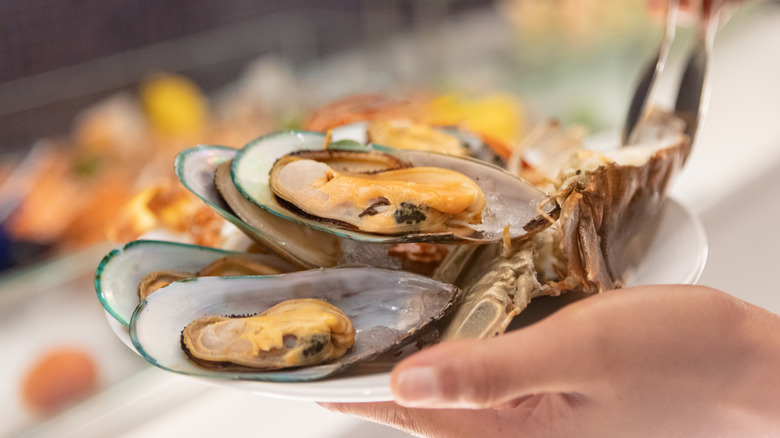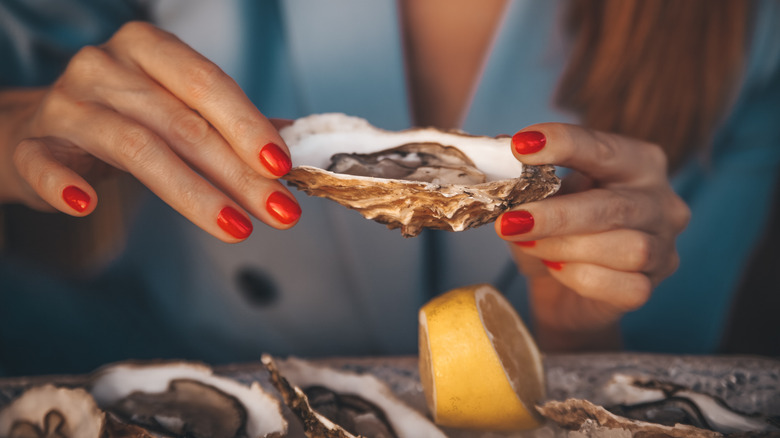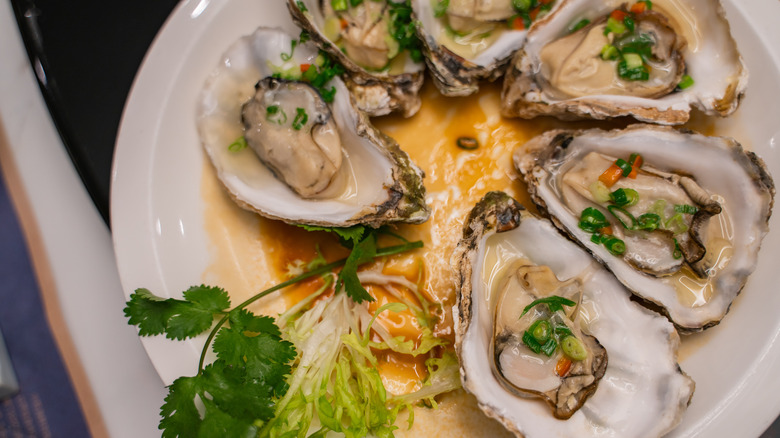Oysters Are Actually Considered A Vegan Seafood (Sort Of)
If you're a vegan, there just may be a new food item that you can enjoy that you've never considered before. It comes from one of the last food groups you'd ever expect: seafood. Vegans, for the most part, certainly do not eat seafood. Since vegans don't eat any meat or products that come from animals, then fish and shellfish are usually included in this. While for many of us, the definition of veganism is fairly cut-and-dry, others find that when it comes to going vegan for ethical reasons, the morality of what we should and shouldn't eat isn't always as black and white as we may think.
There is one food, in particular, that falls into the seafood category, and is causing a surprising amount of controversy among the vegan community. Some vegans think it is acceptable to eat, while others are staunchly against it. So, which sea creature is causing this moral conundrum on land? Believe it or not, it's oysters.
How could oysters possibly be vegan?
For most vegans and non-vegans, the suggestion that an oyster could fit into a vegan diet seems bizarre. Still, oysters may be making their way into a vegan diet on a bit of a technicality. Oysters are bivalve mollusks, which are unarguably living things. There are plenty of once-living things that vegans eat regularly — like any fruit or vegetable. So, while most shelled creatures under the sea are off-limits, there is something that sets oysters apart from crabs, for example, that creates a bit of a moral grey area.
Oysters aren't sentient beings, meaning that it's widely believed that they don't feel pain. They don't have heads, spinal columns, or central nervous systems. Consequently, folks who believe that it's morally wrong to kill something that can feel pain or fear for the purpose of eating it can't really make this argument for oysters. Mussels also fall into this same category. Unsurprisingly, though, not all vegans agree that this should fit into their diet. Since so many vegans have decided to make an exception for this particular food group, an entire subset of veganism has emerged. The subset is most commonly called ostroveganism, which comes from the Latin word "ostrea" which means "oyster." The subset is also sometimes called "bivalvegan."
Should we really incorporate oysters into a vegan diet?
You may be wondering why oysters and mussels — which can't possibly make up a large portion of even the most avid seafood eater's diet — could cause non-meat-eaters to create an entirely new diet surrounding them. Well, there actually is more to ostroveganism than the fact that oysters are delicious and can't feel pain. While veganism has many health benefits, there are some necessary vitamins and nutrients that can be more difficult to consume enough of. Some of these things can be found in bivalves, which can give vegans more of what they need without harming a sentient being. Vitamin B12, for example, which many vegans and vegetarians need to take in pill or shot form, can be consumed through oysters. Another reason why vegans might crave oysters is because they need more zinc. Luckily, there are tons of vegan ways to get more zinc in your diet even if you don't plan on living the ostrovegan life. Beans, chickpeas, many kinds of nuts and seeds, tofu, and quinoa are all zinc-rich foods.
So, there are more benefits to eating oysters than we may have thought, but should you actually eat oysters if you're vegan? Ultimately, every decision about what you incorporate into your diet is up to you, and there are plenty of oyster-loving vegans, just as there are plenty of vegans who would never touch the things. If you're a vegan who's never considered ostroveganism, it's worth thinking about.


